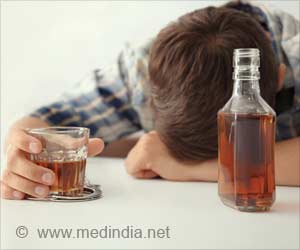The difference between binge-drinking and alcoholism, explained.
- Binge drinking is not necessarily an addiction, but it is linked to a higher risk of alcohol use disorder, and it can have negative effects on a person's physical, mental, and emotional health
- The threshold for binge drinking is five or more drinks for men and four or more drinks for women in a two-hour period
- Alcoholism is characterized by a higher tolerance for alcohol, a lack of self-control, and a persistent dependence on alcohol
High-Intensity Drinking
Go to source). A habit of taking a lot of alcohol quickly, to the point that one's blood alcohol content reaches 0.08% or greater, is considered binge drinking, according to the National Institute on Alcohol Abuse and Alcoholism in the U.S.
A standard definition of binge drinking for a male body is having five drinks or more in a period of two hours; for female bodies, the threshold is four drinks or more. The CDC has referred to binge drinking as "the most prevalent and expensive pattern of excessive alcohol use," while emphasizing that it does not always indicate alcohol dependence (2✔ ✔Trusted Source
Facts About Excessive Drinking Drinking
Go to source).
But what do the stats reveal? Well, 25% of US individuals who are above the age of 18 binge drink at least once a week (3✔ ✔Trusted Source
Binge Drinking Among Adults, by Select Characteristics and State
Go to source).
. Though only one form of excessive drinking, binge drinking makes up the majority of it. Adults in the US who drink excessively report bingeing on over 90% of occasions (4✔ ✔Trusted Source
2010 National and State Costs of Excessive Alcohol Consumption
Go to source).
Are you also on Cloud Wine with this Pro-Drinking Culture?
The pro-drinking culture we live in often starts with a glass of wine, which is frequently the foundation for binge drinking. We've been brainwashed into believing that drinking is the best way to fit in, have fun, make genuine, no-holds-barred pals, and lessen the blow of life's hardships.Peer pressure can take the form of this, urging people to keep drinking until they pass out because doing otherwise can lead to labels like "Sober Sally" and "Party Pooper." People may consume more alcohol than they can handle while feeling overwhelmed or anxious since alcohol has the extra benefit of being a socially acceptable way to relax inhibitions and relieve stress. It serves as a coping mechanism for social anxiety for many people (5✔ ✔Trusted Source
Binge drinking and health-related quality of life: do popular perceptions match reality?
Go to source).
Drinking it Down like a Binge Drinker or Alcoholic?
According to Norman Hoffman, a clinical psychologist, and authority in the clinical assessment of mental health and substance use disorders, "Someone can consume a lot of alcohol and have no signs of an addiction."There's a chance binge drinking is not an addiction. It is linked to a higher risk of alcohol use disorder, also known as alcoholism, and some health organizations even refer to it as "the beginning of a problem." This does not, however, imply that it is not hazardous.
According to Hoffman, "Copious alcohol consumption is definitely not a zero-risk behavior. If you struggle with depression or anxiety and find that alcohol helps you relax, turning to alcohol actually has a tendency to make things worse."
Indeed, having a mental health condition like depression, anxiety, or bipolar illness before developing an alcohol use problem increases the likelihood of doing so. Additionally, overindulging in anything can feel wonderful since it triggers our brains to generate exorbitant amounts of dopamine, whether it be food, shopping, or alcohol (6✔ ✔Trusted Source
Alcoholism and Psychiatric Disorders
Go to source).
What Sets Binge Drinking from Alcoholism
Contrary to binge drinking, alcoholism cannot be diagnosed using criteria that depend on a specific number of drinks. Instead, it is characterized by a higher tolerance for alcohol and a lack of self-control or willpower to quit drinking abruptly, especially when one is aware of the damaging effects of alcohol on one's physical and mental health. Additionally, unlike binge drinking, alcoholism is a persistent illness that does indicate an unhealthy dependence on alcohol, making it a disorder recognized by the Diagnostic and Statistical Manual (DSM).The DSM-5, or the fifth edition of the manual, lists a number of symptoms that could indicate an alcohol use disorder, such as disruption of one's daily life, inability to pursue hobbies and interests due to dependence on alcohol, experiencing withdrawal symptoms if they do attempt to quit, craving alcohol, and spending a lot of time trying to get it (7✔ ✔Trusted Source
Alcohol Use Disorder: A Comparison Between DSM-IV and DSM-5
Go to source).
There are many severity levels of alcoholism. A mild disorder is indicated by three to five symptoms, a moderate disorder by five to six symptoms, and a severe disorder by more than six symptoms. Long-term effects include the development of liver and cardiovascular problems, as well as malignancies.
Even without considering the possibility that it will lead to alcoholism, binge drinking alone has the potential to negatively affect people's lives in a number of different ways. Binge drinking raises the likelihood of people blacking out, hurting themselves, or feeling physically ill, in addition to exposing them to the risk of alcohol poisoning.
Binge drinking can also have an emotional impact on a person, causing them to feel nervous and unhappy and leading them to act in ways they wouldn't if they were sober, which exposes them to a subsequent cycle of regret and humiliation. Additionally, participating in binge drinking behaviors on a regular basis can have an effect on a person's relationships and introduce otherwise avoidable issues — both social and legal — into their lives, sowing the seeds for trouble to come (8✔ ✔Trusted Source
Alcohol, Binge Drinking and Associated Mental Health Problems in Young Urban Chileans
Go to source).
Binge drinking can impair one's cognition and increase their risk of STIs and unexpected pregnancies, frequently as a result of not taking the necessary steps before giving in to their passion. Naturally, both have potential long-term effects. However, for some people, binge drinking can cause momentary sexual dysfunction; if they don't associate it with excessive alcohol consumption, it may affect their sexual confidence (9✔ ✔Trusted Source
Prevalence of sexual dysfunction in male subjects with alcohol dependence
Go to source).
Even if you Overthink, Don’t Over Drink
In other words, although the effects on a person's life may differ greatly between alcoholism, which is chronic, and binge drinking, which is more episodic in that it is separated by intervals of abstention, both are problematic drinking behaviors. Both situations have a negative influence. Therefore, if one is having trouble with either or is starting to see that they are depending on alcohol more and more, it is wise to speak with a specialist.It's never a terrible thing, to be sure, even if it turns out that their drinking was fine and they were just too anxious. Better safe than sorry, as the saying goes.
References:
- High-Intensity Drinking - (https://pubmed.ncbi.nlm.nih.gov/30557148/)
- Facts About Excessive Drinking Drinking - (https://www.cdc.gov/drink-less-be-your-best/facts-about-excessive-drinking/index.html)
- Binge Drinking Among Adults, by Select Characteristics and State - (https://pubmed.ncbi.nlm.nih.gov/34648484/)
- 2010 National and State Costs of Excessive Alcohol Consumption - (https://pubmed.ncbi.nlm.nih.gov/26477807/)
- Binge drinking and health-related quality of life: do popular perceptions match reality? - (https://pubmed.ncbi.nlm.nih.gov/15026103/)
- Alcoholism and Psychiatric Disorders - (https://pubs.niaaa.nih.gov/publications/arh26-2/90-98.htm)
- Alcohol Use Disorder: A Comparison Between DSM–IV and DSM–5 - (https://www.niaaa.nih.gov/publications/brochures-and-fact-sheets/alcohol-use-disorder-comparison-between-dsm)
- Alcohol, Binge Drinking and Associated Mental Health Problems in Young Urban Chileans - (https://www.ncbi.nlm.nih.gov/pmc/articles/PMC4382020/)
- Prevalence of sexual dysfunction in male subjects with alcohol dependence - (https://pubmed.ncbi.nlm.nih.gov/20711392/)
Source-Medindia














